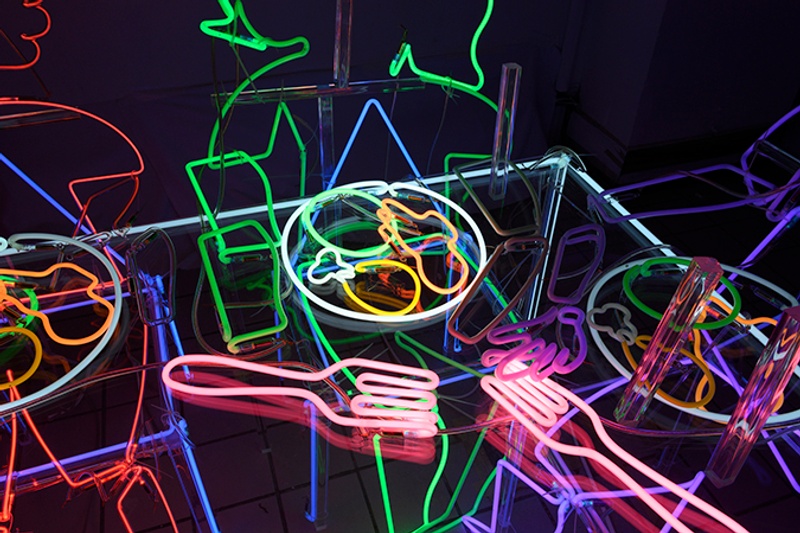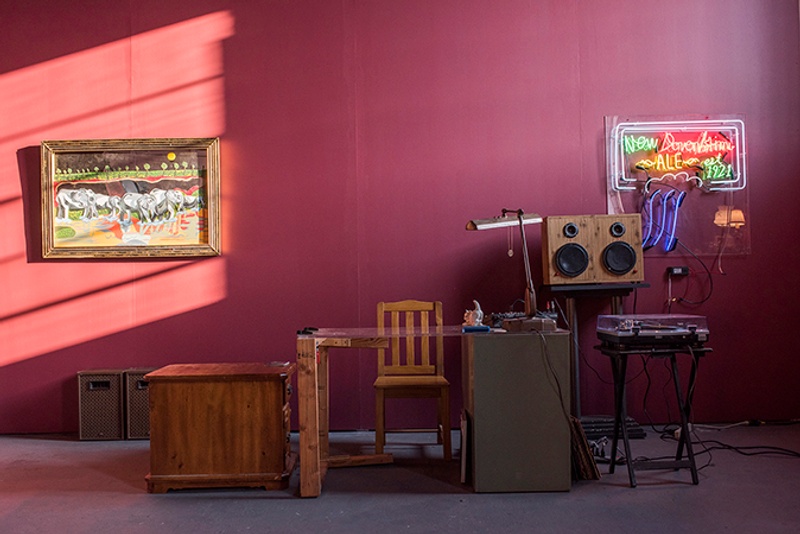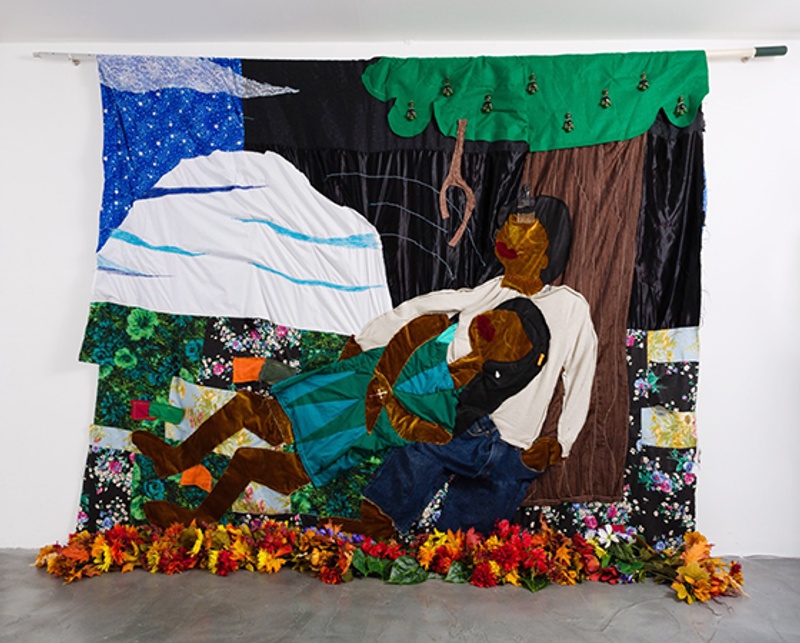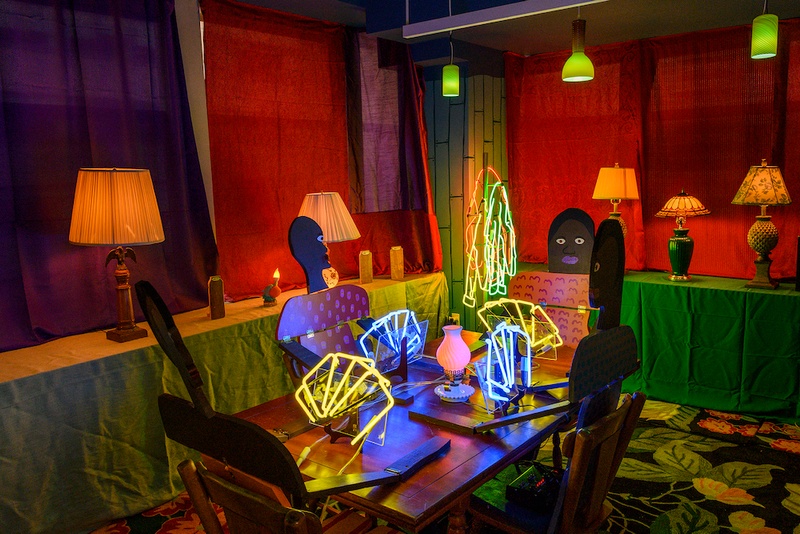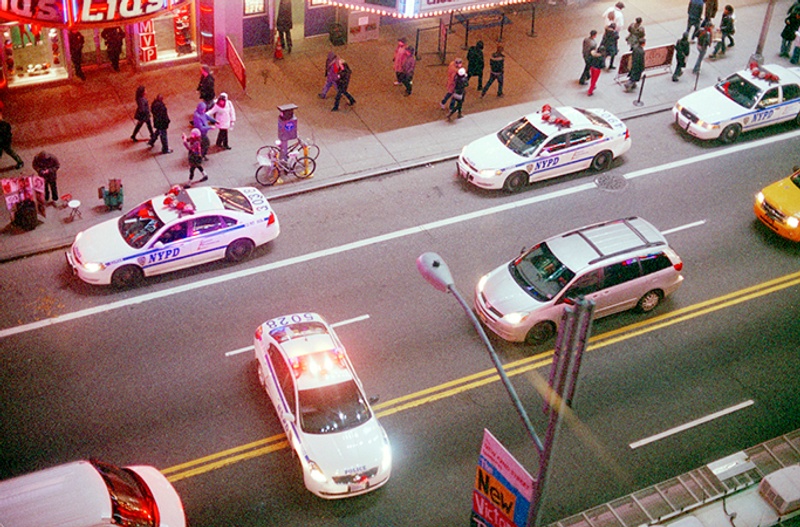What first drew you to music?
I grew up in a silent household. No music. Noise was for outside. Finding music was tough outside, too, because none of my friends listened to anything. I remember one year I got eight copies of the Sisqó album because everyone was an idiot when it came to music.
This is the early ’90s. Video Music Box was a television radio channel on public access. You would watch the music video, and on the bottom of the screen would be a ticker. It would roll by with a phone number you could call, enter a code for the music video, and it was three bucks a video. But what are they playing? There’s only like five videos that exist. There’s nothing to listen to, because they’re finding out about music at the same time we are. If you had access to some form of video device, you made a music video. If somebody paid $3, then it just went on. It didn’t matter how good it was. So it was a democratized means of music. At the beginning of Wu Tang Clan’s “Protect Ya Neck” video you can see the slate. The ticker is at the bottom of like half the video.
I remember there was one song in particular, “1-800 Suicide” by the Gravediggaz. I went over to my grandma’s house where my cousins also lived. They stayed mostly in the basement, a liminal space that as I grow older, I realize the importance of more and more. The basements are where you normally find us, both in the house and otherwise. We need these liminal spaces as black or brown or gay bodies because the main house isn’t a room we are allowed in.
I went down to the basement and I was like, “Hey, I heard this really fucking good song, it’s called ‘1-800 Suicide.’” My cousin Dale said, “No, fuck you. You have no idea what you’re talking about, let me kind of roll this out for you.” He cues up the first Wu-Tang album and plays all of the corresponding Kung Fu movies synced up to where the samples were. Whenever a sample came on, he would stop the album, put on the movie, and we would watch a minute before wherever the sample was, and a minute after. We went through the entire album like this. Mentally I was like, “This is what music is? This is insane. There’s so much here. Why does he know all of this weird shit? Does he do this for other people? Is this a thing I can do?”
It was about realizing a song is a representation of a larger time frame, with a much broader scope of information, that collapses into a small space. And if you know the language that’s being spoken during those three or four minutes, then you don’t need Dale to walk you through this eight hour opus. But you’re always going to be able to appreciate the music more if you have access to that original or the language and jump a lot further.
It also collapsed music with art, like a movie.
Exactly. Even my other cousin, Dwayne, who was passed out in a McDonald’s onesie, holding the menu of what you need to memorize to work at McDonald’s, was singing Method Man’s solo song “Method Man” in his sleep.
I lived around the corner from the Wetlands and Vinyl. I’m surrounded by the physical embodiment of what turns into these legendary jumping grounds for two of my largest interests: house music and rap. But I never went to either. Without any real information about how to actually walk in the door of a music store, or these physical spaces where the jams were being played, I’m just a scared person in life.
I started buying random CDs. I went to Discorama, a small CD chain in New York where everything is alphabetized by genre, where there was a staff selection, like a record store, but it’s only bins of CDs without anybody to talk to you. In a record store, you go in and some asshole comes over like, “Hey, you shouldn’t buy that, you’re a fucking idiot.” Discorama didn’t have that. You just bought something and hoped it didn’t suck.
Blackest Night: A Survey in Blackness, SCAD Museum of Art, 2019.
I’m just buying random CDs, everything Wu-Tang, anything with a kid on the cover, which is how I got De La Soul’s Stakes Is High, and everything else that has anything to do with them. I ended up with jazz, which I knew my father liked, Kung Fu stuff, and Aphex Twin. I kept being like, “Where do these come from? How do I get more?”
When did you start exploring stranger music territory?
That fast forwards to the second giant awakening. I worked at a photo lab. I had enough money to go to Fat Beats every other week when I got paid and I would try to buy seven albums. There was a lady at Fat Beats. I would put my seven albums on the counter and she would make two piles, a “yes” pile and a “no” pile. Whatever went in the “no” pile, she would replace with an equally priced equal amount of records that I should be buying instead of those.
I would get the three or four albums that I wanted, and then three that this lady who wouldn’t let me buy things told me I had to purchase. She was always fucking right. The ones that she let me buy were decent, but she nailed the ones she suggested. I realized she wasn’t being mean, she was being overly nice. Something that happens in the music space very often: brevity in relation to passed on information mistaken for lack of compassion. I find it usually the opposite.
That’s when I joined a poetry group collective, Youth Speaks (which turned into Urban Word). I started getting into electro stuff like CocoRosie because of one of the teachers there. I went to two show types mostly at the time, either the Youth Speaks spoken word events or Dead Prez shows, usually at SOB’s.
It was the third thing that was a big shaking moment in terms of music—just going to SOBS. I would go whenever I could. Since it’s a small, weird venue, you would get fucking insane groups coming through doing weird stuff. Like Humpty Hump, and Shock G of The Digital underground. He went on stage, did “The Humpty Dance” four times, then said, “Okay, you good? Let’s do the real thing.” Took off the nose, the jacket, the hat and then just did analog piano Tupac karaoke and just had people sing along for his dead best friend.
Even when you get to the point where you’re making comical sums of cash, music is still able to translate something, in relation to loss, friendship, and care. You can easily translate that to other people in these kinds of smaller, more intimate settings.
Then we get to DJing.
That happened in college when a friend said, “Hey, you should DJ.” I was like, “I don’t know. I have a few records. But sure, why not?” I started gathering stuff. I had like 100 or so records at the time, which numbers-wise, let’s just say it’s a very different number than what I own now.
I had an iPod, a belt drive turntable, a Yamaha eight channel mixer, and my computer in a triangle. My first few times out I was like, “Oh, right. This is a thing, people do this. Okay, cool, this already makes sense to me.”
Was that because you went to clubs and saw people DJ? Or was this the first time someone had introduced the idea of DJing?
It was the first time it made sense to me from a pragmatic standpoint. My brothers worked in clubs and nightlife, Limelight, The Tunnel, Save the Robots. Either as bouncer, as promoter, as DJ, or just a frequent hanger out-er. But I was underage, and a dweeb, and more comfortable with my CD player walking around high than hanging out in crowded large spaces. I was aware of the concept, but never was it something that I knew personally.
So, I’m in a basement “bartending,” because I have like a five gallon Gatorade thing of jungle juice, and there’s a dude with one of those Numark CDJs that have the CD trays come out. He’s playing some cool tunes. I was like, “Oh, I love that jam.” He’s like, “Yeah, whatever. It’s fine.” We just keep talking, keep getting more wasted. He’s like, “You know what? You should come DJ on Monday at the bar I work at.” Fast forward, we’re fucking hammered, he’s like, “Saturday. Saturday night, all yours.” I was like, “Ah, brutal. Cool.”
New York Summer, 2017-04
Your first gig was all night?
Yeah. And if I’m doing a full pre-Operation-Close-All-Clubs, Giuliani-Bloomberg night, then I need more jams. I get a call from my godmother, and she’s like, “Hey, I hear you’re a DJ now, I got some records for you.” She gives me 300-something records, all 12-inches. Maybe one or two albums in there, and I’ve never heard any of it—it’s all extended version remixes of disco funk stuff.
Because everything was used, my method was to clean first, know the item second, and third let the record’s physical qualities dictate what the record can do. As in, if one song scratched, there’s a reason this one song is scratched, and I should use that when I play. That’s why I like physical music. And about half of them were just cooked, like put the needle on, it just floats straight across. I went, “Oh, these are the good ones.”
Instead of tossing the inaudible ones, you’d recognize they likely just had the heaviest rotation to her—the best, not the worst.
Yes. And the first time I played, I had a fucking milk crate taped to one of those little handcarts. It went really well. I came back the next Saturday, and then I kept getting invited back. I would just keep trying to get better and better, because the better a job I do, the more mixing I do, the more records that I buy that are really cool, the bar makes more money, we have more fun.
It sounds like it’s about stewardship—playing something out loud and seeing who comes back to pass it to, finding out who wants to have that dialog.
That’s one of my rules: send your dialog out and something will come back. If someone makes a reasonable request, and I don’t have it, I will go out, purchase that record, and bring it next week, and if you come back next week I’ll play it whenever you get there.
Why do you think that back and forth is so critical to you and to the music that you’re sharing?
Because it’s not me, it’s us. I happen to be the one that’s playing the jams right now, but I’m equally as stoked when I see my friends play as when I’m playing. Because, for one, my friends are almost all better than I am, but outside of them just being fucking monsters, there’s something about being in the room where you know that everybody that came into that room made at least, on a scale of one to 10, seven of the same decisions you made to get into that room, and there’s not a lot of circumstances where you know everybody who is in the room is in the room for the same reason.
This is still how I think of it working—everybody in that room said “yes.” There’s a shared responsibility to contain that. Marginalized bodies need to have a liminal space, too. That’s why Blacks and gays have always had nightclubs. Because it’s a place where we can just kind of hang out, chill, have it not be a fucking issue, because everything else is a fucking issue.
Almost all of your visual art is about building a liminal space to share something. You graduated from Bard in 2005 and work in photography, neon, and installation. Those media feel very intentional because they’re good at inviting the viewer in. Why is it important to make art that lets people in?
There are enough spaces, especially for marginalized people, that tell us “no.” I refuse to be responsible for another circumstance in which we’re going to be told no. Not going to do it. I’m tired of it. Most people I know are also fucking tired of it.
Visual art has the power to create experiences that get you over the shitty ones. That’s hard to do if the thing that you’re making is only filled with you, because then you’re asking a person to take you with them, and we don’t always have space for another person. Sometimes I only have space for me. Why should I have to have another person on my shoulder? Let that other person be a different version of me. Let it be a me dictated by you. When you make an installation that allows someone else in, that process isn’t complete until they’re physically and mentally present within that situation. That way you have made something that you can have as the maker, but also more importantly somebody else can share equally.
It it sounds like a “yes and” relationship, like any of the pawn shops that you’ve created, or the work on New Davonhaime. All of it seems to point towards: this space is for me, and that space is for you, not only because it’s inherently imagined, but because it’s imagined, so that they could see themselves reflected in it.
Right. Super quick, I get real wordy about this. It’s a thrift store, not a pawn shop. Because “pawn shop:” predatory. “Thrift store:” library. And not imagined, conceived. Because imagined is the same as utopia, it’s something that doesn’t, isn’t and never can be.
Jimmy’s Thrift of New Davonhaime, 2017
People talk about New Davonhaime as a utopia. Utopia is a promise that nobody has the courage to fulfill. It’s inherently failed, because it never can exist. An idea that can never come to fruition is not a goal, it’s a dream, and dreams are places we put stuff too difficult to work toward. It’s an idea that’s put into you, by you, that is created from real experiences and real circumstances, but kind of fudged and a little weird, some things aren’t real, some things are, but there’s never the responsibility for caring for a real circumstance.
When you make decisions that lead towards goals: my goal is to have a building, okay, but then also it’s saying once I get that building it’s now mine, and I have to take care of it. I have to pay property taxes. There’s a weird water stain on the wall I got to fix. It’s a task, and a series of tasks, and you saying yes to a grand series of tasks.
New Davonhaime works well because the tasks can be and are generated by whomever. I provide a starter pack, but then whoever is in need of an other space, it can be that space. I always make a point to say it’s not imagined, because it’s based on five real places, and each of those places was an attempt at this idea that didn’t work to some degree, so then there was another one.
Why is geography interesting to you?
Geography, specifically in relation to Black Americans, is the most fascinating way to tell the story of the people. Because with most racial groups, ethnic groups of whatever sort, there’s a physical ground you can return to, conceptually, actually. For Black Americans, there is no ground to return to. Even with the whole back to Africa thing—yeah, sure, where? What country? A lot of those lines were tribal lines that then were turned into country lines, so even if you managed to trace it, it’s probably different now.
Blackness is an American idea, and the root of that idea is that the ground that we have to return to, that we have, is American ground. But we never owned that ground. We were brought here to till someone else’s ground. As a people with no physical landmass, what are the physical and mental spaces that we can return to when we’re fucking up, when something is wrong, when we want to get in touch with them?
A lot of those have to rise out of the American ground, and turn cultural, which is why Black culture spins at such an insane rate, because that is our ground. A lot of the media we create starts as a way to try and build a ground, or to share an idea, because the ground normally has the ideas, the truisms, but if there is no ground, then you have to make what would normally live in the ground live in the air. Live in your body.
Instead of there being a Black style of houses or homes, we have cars. Southern car culture. Instead of agriculture, we have dishes. We have the second piece that makes up for the first, because the second is so well crafted. If ground is the repository for ideas—land has memory, it gets scarred, it hurts, it grows back, it bleeds—since we don’t have an inherent one, any one can be ours. How long does it take before you stick enough stuff in the ground until it becomes yours?
Azikiwe Mohammed at SPRING/BREAK, 2020
The work you had at SPRING/BREAK was a homage to a basement club called Subway Lounge in Jackson, Mississippi. The lounge was in a basement. So it’s literally below ground, or was the ground itself.
It was undesirable ground, which is why we’re allowed to have it. Because it was a leftover. You couldn’t even see it from the streets. So we’re allowed to have it then, but then what do you do with the ground when no one’s looking? You have weird nightclubs. You fucking stay, because there’s no sun. Stay as long as you want.
I sat and hung out at it. It was peaceful to see people hang out for what seemed like three or four times the amount of time they’d spend at another installation. It let them slow down and strike up a conversation with you, because you were in one of the corners playing records.
There’s no separation between art and music in my head. They’re the same. It’s a pendulum. And the cool thing about pendulums is every part of it spends an equal amount of time on either side.
If you can make a space that has the things that nobody should have to ask for, like good tunes, sitting carpet, someone to talk to, then everybody’s going to feel more comfortable and want to stay longer because they don’t have to ask for anything. It’s just being provided. As long as that is centered at the core of whatever you’re doing, it’s going to work.
The maker can often really get in the fucking way. For the most part, being there allows me to say, “Hey, what is something that you’re not getting?” And you know I’m going to be there, so you don’t have to answer right then, but if you think of something, you can come back and know I’m still going to be there and tell me, “Hey, you got this wrong.” Generally, you go to a show, you see a thing. You’re like, “Aw, man. I hope the next one is better. I like this part. This one was weird.” What if I can change that in real time? What if I could take something off the wall and put a new thing up? What if I can change the tunes? What if I can change a part of the work to make sure that you’re not made invisible, so you have the option to feel seen and heard.
Is there something music does very well that visual art doesn’t do very well?
When I listen to music, I’m thinking about memories. I’m seeing and thinking about stuff sparked by the audio event that is happening. Music lets me have these visual visitations. It jumpstarts my mind when I didn’t know my battery was dead. Visual art has the capacity to do that for me, but doesn’t always. Too much visual information is often present for me to generate my own. That’s why not all songs need music videos. You made a good song. Let the song fucking rule. There are times when the video does match and it fits and that’s cool and great and that’s wonderful, but usually I don’t need it. Let me do that work.
What does visual art do that music struggles with?
When you see a photograph, it’s really easy to finish a visual idea. You have a concrete starting point. I find it less easy to finish a sonic idea. Sometimes the two can live together, like with Wu Tang, the visuals match the noises and the production quality being rocky on both sides makes for a very happy holding of hands between the two. Also, the two languages of things to see and things to hear come from the same place.
From a visual standpoint, when you’re giving someone something to look at, it’s easier to have five clues laid out and let somebody else write the other five. A series of five photographs. Five objects placed in a room. With music I find it a little harder to grab those five clues and know what they mean.
Knowing the language helps. This is why a lot of people make a music video. It’s to spell out the song for people. Provide those five clues, but usually it’s not five clues laid out about the song, it’s five totally different clues. Then in your head you’ve been tasked with stapling those two together and that’s bullshit.
It makes it so much better when you can get music and art in the same room. When they come together, naturally, they’re not only best friends, but inseparable friends. They’re always in the same room, they just often aren’t looking at each other. When you can get them to look at each other from across the bar, then a real incredible thing can happen.
It’s a moment like that when you know a piece works or doesn’t. I’m not talking about “success,” but if something “works.”
Success is fine. As long as within that same breath you are including the word failure. Otherwise, yes, throw success out. Because I think something works when somebody tells me it doesn’t. If I was able to provide enough of something that you could envision what it looks like, fixed or completed, the piece works. If you can get to a point with a complete fucking stranger where they feel comfortable enough, or somehow responsible for telling you your work sucks, you nailed it.
That’s why I try to be at every opening if possible. That’s why I try to be at my shows. It’s part of the work. And accept when you’re wrong. If you’re not wrong often, you’re probably not asking large enough questions.
12-29-3
Azikiwe Mohammed recommends:
records to keep you company
-
Björk, Vespertine
-
McCoy Tyner, Atlantis
-
N.W.A, Niggaz4Life
-
Live recordings of Prince
This content originally appeared on The Creative Independent and was authored by Daniel Sharp.
Daniel Sharp | Radio Free (2021-09-02T07:00:00+00:00) Visual artist and DJ Azikiwe Mohammed on being a steward to art and music. Retrieved from https://www.radiofree.org/2021/09/02/visual-artist-and-dj-azikiwe-mohammed-on-being-a-steward-to-art-and-music-2/
Please log in to upload a file.
There are no updates yet.
Click the Upload button above to add an update.
